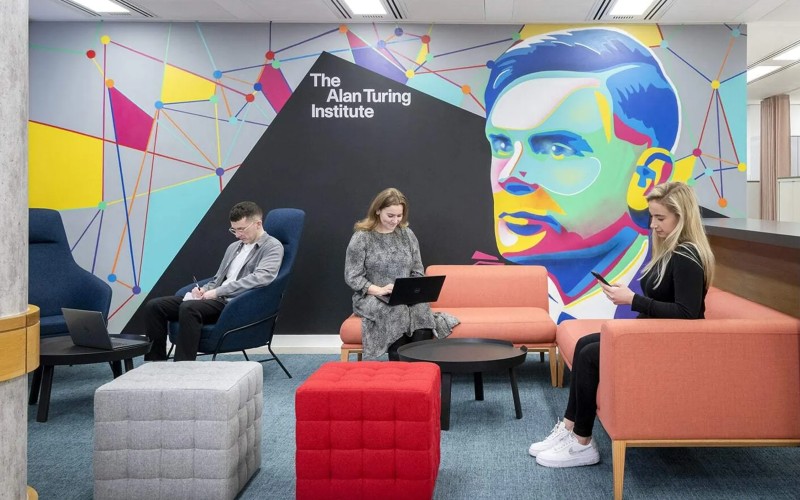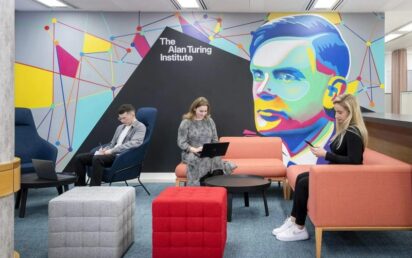The Alan Turing Institute was meant to be Britain’s answer to Silicon Valley’s AI labs — a national centre combining Britain’s best academic research and industry expertise.
Now, behind its glass walls at the British Library, tensions are spilling over.
Letters of no confidence, whistleblower complaints and demands from ministers to change direction have left the UK’s flagship AI hub fighting for its identity and potentially its future.
A national vision
Founded in 2015, the Alan Turing Institute was launched as the UK’s national hub for data science and AI.
Named after the pioneering mathematician, computer scientist and World War II hero Alan Turing, it has been backed by the government and a consortium of leading universities, as it started out to combine expert research with real-world impact.
Five founding universities – Cambridge, Edinburgh, Oxford, UCL and Warwick – and the UK Engineering and Physical Sciences Research Council created the Institute a decade ago.
Eight universities – Leeds, Manchester, Newcastle, Queen Mary University of London, Birmingham, Exeter, Bristol, and Southampton – later joined in 2018.
Over the years, its projects have ranged from healthcare analytics and environmental modelling to AI ethics and democratic resilience.
The aim was to unite academic talent, public funding and private sector collaboration to help the UK compete in the global AI race.
Today, the mood inside is reportedly anything but triumphant.
A combination of governance problems, strategic tensions and staff unrest has pushed the organisation into one of the most turbulent periods in its history.
The impact of the Institute
Since its founding, the organisation has made significant strides in applying AI and data science to tackle challenges in society.
Its collaborations with government bodies and academic partners have benefited many sectors in the tech industry and beyond.
One initiative saw the Institute partnering with the Geospatial Commission to develop AI-driven simulations assessing how land use planning decisions affect residents’ quality of life – a tool designed to inform better policymaking.
In environmental science, Aardvark Weather was developed just this March by researchers at the University of Cambridge, supported by The Alan Turing Institute.
According to data, it can deliver accurate forecasts tens of times faster whilst using thousands of times less computing power than current AI and physics-based forecasting systems.
Healthcare has also been a key focus. Researchers at the Institute have pioneered ‘digital twin’ technology, creating AI-powered virtual replicas of patients’ hearts to support personalised treatment and improved health outcomes.
Alongside this, teams working on AI for public services are exploring the impact of emerging technologies like generative AI on children, engaging with families and educators to understand and shape its social implications.
The Institute’s commitment to data science for social good is further demonstrated by programmes like DSSGx UK at the University of Warwick, which trained students to develop data-driven solutions in partnership with government agencies and non-profits including Ofsted and World Bank, addressing critical social issues through innovation.
This was, however, scrapped after running from 2019-2023.
Obituary: Dame Stephanie Shirley, female tech pioneer & philanthropist
The people at the top
The Institute is led by chief executive Jean Innes, who joined in 2023 after a career spanning the Treasury, Amazon, Rightmove and AI startup Faculty.
Chair of the board is Doug Gurr, former head of Amazon UK and ex-chair of the Competition and Markets Authority, who has been steering the governance side.
Other board members include senior figures from partner universities, such as Professor Anne Trefethen of Oxford and Professor Jane Hillston of Edinburgh.
How it came to this
An independent review in 2024 found that ‘the governance structure that was set up when the Institute was formed is now a hindrance’ to its role as a national hub for AI.
A detailed report from British Progress highlighted how decision-making power is split between funders and university partners, creating blurred accountability and making it harder to set a coherent national strategy.
It also noted that some projects overlapped with work being done elsewhere, reducing the Institute’s unique impact.
In response, management launched what it called ‘Turing 2.0’ – a sweeping overhaul to focus on fewer, bigger programmes.
That meant shutting down or transferring a quarter of existing projects, many of them in socially focused areas such as online safety, health inequality and AI ethics. Staff say this process was abrupt, poorly communicated and at odds with the Institute’s founding principles.
The changes also coincided with growing diversity concerns. In early 2024, more than 180 staff signed a letter criticising the Institute’s senior leadership for its lack of gender diversity, pointing out the appointment of four men to top roles and questioning whether inclusion was being taken seriously.
Later that year, 93 employees sent a letter of no confidence to the board, citing not only governance and transparency issues, but also ongoing concerns over diversity, strategic direction and a looming redundancy round.
Pressure from above
The Alan Turing Institute has more recently faced mounting pressure from government ministers, with Technology Secretary Peter Kyle urging a significant pivot in the organisation’s focus.
Kyle has called on the Institute to concentrate on defence, national security and sovereign AI capabilities, suggesting that its future funding — including a government grant of £100m pledged last year — could be at risk unless these changes are embraced.
He has also pushed for an overhaul of the Institute’s leadership as part of this strategic realignment.
This proposed shift represents a major change for the publicly funded body, which was originally founded in 2015 as the UK’s leading centre for AI research spanning health, environmental sustainability and wider societal challenges.
Kyle’s letter in July and the resulting uncertainty have now triggered serious internal concerns.
Staff submitted a whistleblowing complaint to the Charity Commission, citing “serious and escalating concerns” about governance instability, misuse of public funds and a toxic internal culture defined by fear and defensiveness.
The complaint highlighted fears that the risk of funding withdrawal could lead to the Institute’s collapse and criticised spending decisions lacking transparency and trustee oversight.
It also accused senior leadership, including board chair Gurr, of failing to meaningfully address these issues despite repeated warnings from staff.
A government spokesperson confirmed to the BBC that Kyle ‘has been clear he wants [the Institute] to deliver real value for money for taxpayers’.
Meanwhile, a Department for Science, Innovation & Technology (DSIT) spokesperson emphasised that the Institute is an independent organisation consulting on changes under its ‘Turing 2.0’ strategy, which aims to refocus its work and respond to national needs, including doubling down on defence and national security research.
The Institute itself has acknowledged the organisational challenges, saying it is making ‘substantial organisational change’ to better deliver on its role and societal impact.
However, the unfolding turmoil has left many employees anxious about the future direction and whether the original mission of the Alan Turing Institute is being sidelined.
Although the Institute has stated it has not been formally notified of the complaint, the very act of whistleblowing reflects the angst among employees.
Redundancies affecting around 10% of the workforce and the abrupt closure or transfer of projects are bound to have only heightened anxiety.
Jeopardy, uncertainty and unrest now linger at an organisation which was once the nucleus of a vision for a collaborative and inclusive AI centre.


